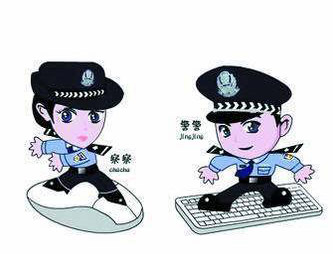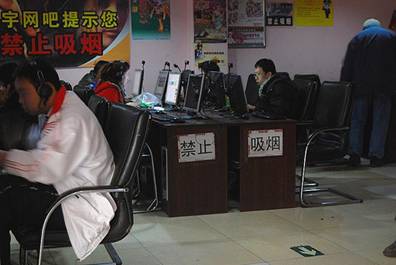
Photo: Xinhuanet.com
With news recently surrounding internet porn blocks on the internet in China, this article takes a look at the issue of cyber policing from the point of view of the government. How much do you think, if at all, the internet needs policing?
At the beginning of 2008, a famous Chinese gaming website became the victim of a hacking gang who not only stole gaming passwords but also spread viruses around the system. Immediately China’s Cyber Boys in Blue were on the case. They act quickly to make sure that illegal websites get shut down and to make sure that content deemed immoral and dangerous is kept off the internet for the benefit of the people.
Every country in the world has web police and they all patrol the internet. In the case of China, they work closely with the people.
On Jan 1st 2006 Shenzhen cyber police launched two cartoon characters pictured above, Jing Jing and Cha Cha (Jingcha means ‘police’ in Chinese) that when clicked on linked through to the cyber police site in order to report illegal content. After a couple of prank clicks, people got the idea that the police meant business. Within one year there has been over 6500 alerts. Behind the scenes is a team of 8 cyber police officers who work in shifts to keep watch 24 hours a day and respond to alerts within 10 minutes.
The transparent method of working with the people, the actual web users of China to police the internet started in Shenzhen and today has become a huge success across China, from Heilongjiang to Hunan, cyber police units are using more and more alerts from members of the public to monitor the internet, as opposed to being a secretive organization, the police are working hand in hand with the netizens.

Photo: faungg
The internet is a double edged sword; on the one hand it allows China to be more in touch with the outside world, yet on the other people can end up drowning in information. The internet also both opens the door to so many chances to learn and do business, and also so many chances to be cheated, harmed or exploited.
China’s attempts to invest and upgrade its systems have met much critism recently from the USA, who in 2008 attacked what it called ‘The Great Firewall of China’ for being too invasive and restrictive. In actual fact, however, it is US government policy to not only check the US internet, but to also snoop into foreign e-mails. Furthermore, the world’s best internet monitoring software is made in the Netherlands.
The Chinese government is committed, not to the restriction of the rights of law abiding citizens, but to the prevention of people intent on causing mischief and spreading illegal material through the internet. In that respect China is no different to the USA or any other country.
The Role of China’s Internet Police
According to the laws governing the protection of the safety of information laws passed by the high court in 1994, China’s cyber police work in the following roles:
1. Inspect, examine and guide the work to protect the safety of information.
2. Chase up any cases of information that might cause harm.
3. Take reasonability for other work related to information safety. Those responsibilities include:
A. Promoting knowledge of internet safety law.
B. Inspect work done on internet safety.
C. Help combat virus spread on the internet.
D. Oversee the sale of equipment used for internet safety.
***
Related Links:
'Porn star' detained for posting sex film on Internet
China shuts down 50 more porn Web sites in sweep
The Battle’s Frontline – China’s Internet Cafés
What do you think is the biggest issue facing China in the coming year?
Warning:The use of any news and articles published on eChinacities.com without written permission from eChinacities.com constitutes copyright infringement, and legal action can be taken.
All comments are subject to moderation by eChinacities.com staff. Because we wish to encourage healthy and productive dialogue we ask that all comments remain polite, free of profanity or name calling, and relevant to the original post and subsequent discussion. Comments will not be deleted because of the viewpoints they express, only if the mode of expression itself is inappropriate.
Please login to add a comment. Click here to login immediately.
Hi there!
We've just launched a brand new Answers section which allows users to ask or answer other people's questions. To increase your chances of getting a fast and satisfactory reply (and to start accumulating points for great prizes) please ask your question here:
answers.echinacities.com
Thanks a lot!
Jun 07, 2011 07:23 Report Abuse